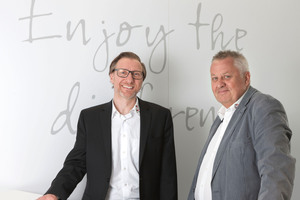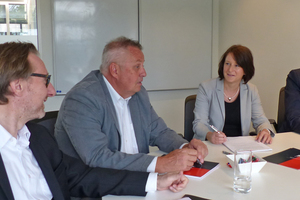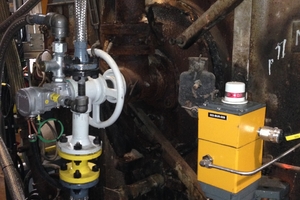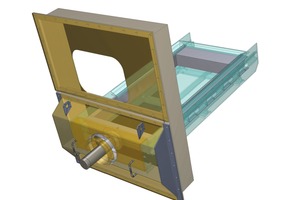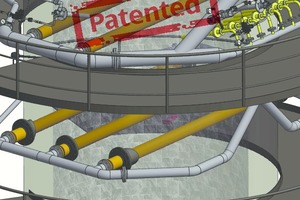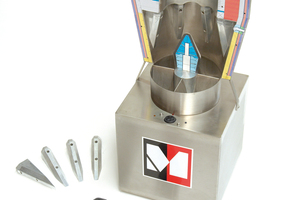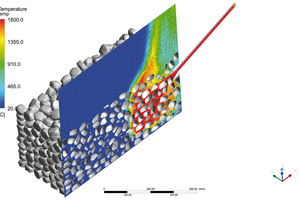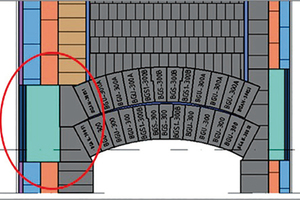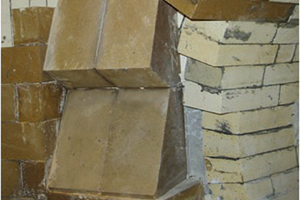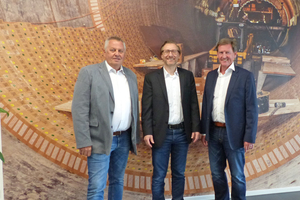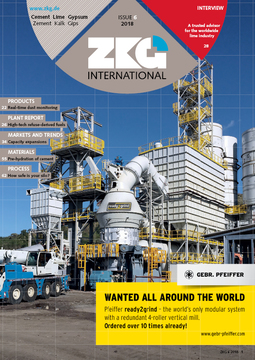A trusted advisor for the worldwide lime industry
The M-Group, an internationally operating group of companies, based in Lemgo/Germany, is pleased to announce the merger of its subsidiaries Eberhardt GmbH and Schwab GmbH, both specialized in lime kilns. Eberhardt GmbH can look back on more than 150 years of experience in the construction of lime shaft kilns with coke, oil and gas firing systems for the sugar and soda industries. Schwab GmbH has firmly established itself on the market over the past 25 years thanks to its expertise in refractory solutions for lime kilns. The name of the new company will be Eberhardt Schwab GmbH. We talked to Michael Hünerlage and Harald Schwab about the reasons for the merger.
MICHAEL HÜNERLAGE: Both companies specialize in lime kilns, but with very different focuses. In the lime industry, the name Schwab is synonymous with refractory linings, while Eberhardt is known for lime kilns for the soda and sugar industries. Since back in 2004, Schwab GmbH has also added Refractories and Plant Engineering to its name. The plant engineering business was covered by Eberhardt internally. We have noticed increasingly that the enquiries from our customers are overlapping more and more. At Eberhardt, questions concerning refractories engineering were often factored in, while at Schwab enquiries refer to kilns, mechanical aspects and process engineering.
HARALD SCHWAB: Yes, that’s right. We have in the past worked together well within the group and complemented each other. We have always been present together at events and conferences and could no longer really explain why we were still operating parallel. Our engineers and project managers have been working together in a coordinated approach for a long time – now we‘re offering a joint package of products and services. This merger is not only a signal for our customers, but also for our employees.
MICHAEL HÜNERLAGE: One objective of the merger is to assure and continue Harald Schwab‘s know-how and the Schwab brand. We have successfully managed to integrate expert knowledge into Eberhardt in 2008 with the Schaffrath brand. That is why we are sure that we can do it again.
Awareness of the Schwab brand in lime is much more significant worldwide than that of the Eberhardt brand. We want to use this to offer the Eberhardt portfolio in the lime industry, too. Accordingly, a shared company name is just logical.
HARALD SCHWAB: It is important to me that my know-how won’t at some point “go into retirement” with me. I have therefore decided to step down as a partner so that the two companies could be merged. I am 59 now and should like to work a few years yet for Eberhardt Schwab GmbH.
MICHAEL HÜNERLAGE: The customers no longer need to wonder about which company he should turn to. In the past, that has often led to confusion because we have already executed some projects together in a cross-company process. But that is just a formality. It is important for our customers that the entire lime kiln, down to the smallest detail, is covered by one company. We support customers with new installations in the same way as for retrofits, process engineering, mechanics, refractory engineering and optimization. Moreover detailed consultation with regard to kiln operation or firing systems are part of our services. We have the range of products and services for this and above all the expertise, which is unique in its sheer scope. With Eberhardt Schwab in a single package, no challenge and no problem concerning lime kilns are left unresolved.
It is our most important objective to establish ourselves as a “trusted advisor” for the customers. With Eberhardt Schwab the customers have a contact person for all aspects concerning their lime kiln.
HARALD SCHWAB: I, too, see a great opportunity here. As a refractories specialist, I have in the past often had to deal with kiln engineering. With the merger, much better possibilities are now available. It is important for our customers that the know-how available at Schwab is passed on. I see here in the M-Group a lot of young talent with which we can do something. For me, it is really an exciting time and I am looking forward to it.
MICHAEL HÜNERLAGE: By the end of the year, the key elements will have been relocated to our site in Lemgo: warehouse, design, project processing, export business, etc. just to name some of them. Even if Harald Schwab will for now continue to operate from his base in Dannenfels, he will be finding his way to Lemgo more and more often. These synergies are simply compelling and just smart. Why should you keep two of something that you only need one of?
HARALD SCHWAB: The name Schwab stands for innovative lining concepts for all limestone brick lining concepts available on the market. I was never just a pen pusher tied to my desk. I have always travelled out to customers, spoken to them and, wherever possible, I have gone into the kilns. My credo is: from the field for the field. This learning from damage patterns and then finding solutions, that is certainly unique. Actually, for every type of kiln, there is a specific lining concept “Made by Schwab”. Customers choose, for example, a PFR kiln from a certain kiln manufacturer, and independent of this they also choose a lining from Schwab.
At Schwab, we created material flow models for all common kiln types to optimize the geometry in refractories. From this, really trail-blazing findings were obtained.
MICHAEL HÜNERLAGE: At Eberhardt, the development of the calcining kiln feed for mixed-fuel kilns was an important step. With this system, it is possible to feed coke-fired kilns with up to 8 m shell diameter and with a mixture of fuel and limestone homogeneously over a wide area. Such a kiln has a daily output of 500 t Run-Of-Kiln (ROK) lime.
Also worth mentioning is the integration of the company H.-J. Schaffrath in Eberhardt in 2008. Schaffrath’s mechanical systems are not only used for Eberhardt kilns, but for many years now for every possible lime shaft kiln used in the lime industry. And, accordingly we can offer retrofit projects for practically all types of kiln in the world.
Important for development are also our flow simulations that we have conducted in cooperation with Ostwestfalen-Lippe University of Applied Sciences in Lemgo. With these simulations, we are now able to predict process flows better and better.
The last milestone is our European patent for the GDS system (Gas Distribution System). Here a beam system is used to introduce a mixture of natural gas and air into the kiln cross-section. The water-cooled beams are fitted with a large number of nozzles that enable homogeneous energy distribution over the whole area. We took over the system from a USA licence, extended it to qualify it for a patent and were granted the patent. The system has already been installed twice in Germany in the sugar industry. At present a new kiln is being installed in the USA which for the first time has been designed with a kiln daily output in excess of 200 t ROK lime.
MICHAEL HÜNERLAGE: Our holistic approach. In the case of refractory damage, for example, we always look at why the damage has occurred. What changes can be made to the process, to the burners or the mechanical systems so that this damage does not recur. We want to take a holistic approach for our customers and support them in tackling any problems that may arise.
MICHAEL HÜNERLAGE: It will be exactly the same in future. The global players in the lime sector have always bought the engineering for their projects worldwide and we have already supplied some key components. Just up to now, Eberhardt as an expert in kiln engineering and components for lime kilns has been basically non-existent for customers in the lime industry, they just weren’t aware of the company’s strengths in this area.
That is also one of the reasons we have merged. We want to introduce Eberhardt’s complete know-how to the lime kiln operators and that via the sales channels of the former Schwab GmbH.
MICHAEL HÜNERLAGE: No, we don’t want to do that under any circumstances as the kiln engineering companies are our customers, too, and benefit from our experience and expertise for their own kiln products. We see the home of our Eberhardt kiln quite clearly in the sugar and soda industries. The most favourable kiln in terms of energy consumption and currently the most widely used kiln in the lime industry is the twin-shaft kiln. It will be state of the art in the long run. Here, it doesn’t make much sense to compete with the existing suppliers. We prefer to seek cooperation with them and dialogue with the future owners of twin-shaft kilns. But I think we have some good detail solutions in our engineering portfolio that can be applied to many types of kiln and from which the end-customer can only benefit. For example, a refractory lining concept that comes from Schwab, a “Schwab lining” as I like to call it. With his engineering firm, Harald Schwab has managed, first and foremost based on his intensive consultancy services and consultation expertise, to develop a better solution than the standard one.
HARALD SCHWAB: There are so many kilns around the world for which support is no longer available. The companies that have built these kilns have long since ceased trading. That applies to annular shaft kilns just as much as to multichamber kilns. We want to be the first port of call as a partner for everything to do with retrofits, with the revamping and optimization of kilns that have been about for 20, 30, 40 years and for which there’s no longer a proper contact person. If tomorrow someone decides to modernize their annular shaft kiln, then they are at the right address when they call on us: from refractories through firing technology, kiln feed and discharge to factory audits and commissioning.
HARALD SCHWAB: Yes, you could say that. You see, our customers are undergoing a generation change. New people have come up and suddenly the question is: I need a fan. Is the installed fan still sufficient? Can we do some new calculations? I am often approached with such questions and I pass these on. That is where Eberhardt comes in and now where we as the company Eberhardt Schwab come in.
MICHAEL HÜNERLAGE: One thing is clear. With this merger, there won’t be any new kiln engineering company on the market. The situation on the market has not changed and won’t change. For the installed kilns in the lime industry, that is where our strengths are, with retrofits, repairs, optimization and consultation services. We understand how to optimize a kiln as a whole.
Today, many lime kiln operators go to just any consultant, just any technician. We are a trusted advisor, a contact person for everything from A to Z. We are interested in longterm cooperation bet-ween companies.
HARALD SCHWAB: In the trades, digitalization is difficult. We are working on optimizing our lining systems and the procedures within the framework of making repairs. With regard to these topics, we work closely with the university and the Fraunhofer Institute.
The whole digitalization will certainly take some time in our industry. We still need a man on site to check the winch, the burners, etc. You can install cameras everywhere. But you need people to look at the cameras and understand what they are looking at. It has also been our experience that customers tend to be rather critical when it comes to all their data being sent to the kiln manufacturers.
MICHAEL HÜNERLAGE: We offer services when damage occurs, or a problem arises. Our approach is to use data loggers in the kilns we build, log data and go online when required, e.g. in the case of damage. On the basis of the logged data, I can look at the historical course of events leading up to this damage pattern. If the customers open up their control system to us, we can respond quickly in the event of damage. That is all state of the art.
We are currently discussing other projects in which we want to take over control functions digitally. But data security is a big factor here.
MICHAEL HÜNERLAGE: Absolutely. But for us, application orientation is always important. We don’t just bandy about theoretical values, we implement these in practice. We go up to a customer and say try doing something like this and then we try it out with the customer. Then we can say afterwards, what we worked out here in theory will also work in practice.
HARALD SCHWAB: It’s best for us when a customer comes to us with a problem and asks what we’d do. In 2006, one customer was plagued by the problem that at one place in the annular shaft kiln the firing chamber was constantly getting broken. A normal refractory repair company would have gone in and just kept repairing it. We worked with the customer to look at what had actually happened and simulated the combustion process. This showed that the problem was to do with the burner swirl and the conditions for the installation of the injector. We began optimizing the burners to get the swirl under control.
One example of a flow simulation was the simulation of combustion of a gas lance in a limestone bed. Together with the university, we adjusted the parameters such that the simulation results fitted those in practice perfectly. Then we published the results and discussed them because suddenly it became clear that we only had an energy penetration depth of around 30 cm. Then the question suddenly arose: Do I have enough lances in certain kilns?
MICHAEL HÜNERLAGE: From that we have developed our European patent (GDS). Here on one beam alone are 23 jet nozzles, that is on this level alone there are no fewer than 60 jet nozzles. So even if they all have just 30 cm penetration depth, I still get energy flowing through an extensive area.
MICHAEL HÜNERLAGE: We are currently installing three new gas-fired Eberhardt-G kilns in Egypt. All three have a daily capacity of 150 t ROK burnt lime. In the Czech Republic, we are equipping a new Qualical SYN 70 with a Schwab lining.
HARALD SCHWAB: Many years ago, the hot topic was lignite dust firing and the question was: How do we get energy into the kilns. In the meantime, for price reasons, we are back on the gas track. With the GDS solution to switch from coke to natural gas, we can certainly contribute to reducing emissions and compliance with air pollution regulations in case of existing kilns.
MICHAEL HÜNERLAGE: In the lime field, one tends to associate Eberhardt with soda and sugar, in connection with coke kilns. Many people don’t know about our oil- and gas-fired kilns that we have installed in Iran, Egypt and America.
Another interesting niche that we have occupied is annular shaft kilns. The actual supplier of burners for annular shaft kilns doesn’t exist anymore. In Canada, we have now concluded a project with the only annular shaft kiln in North America, where the customer wanted to switch from oil to natural gas. With our expertise and experience we have built the burners ourselves and incorporated even more modern pilot burners. We have done the complete engineering and commissioned the kiln. Moreover, we have trained 21 employees at the factory in theory and practice both in Canada as well as by job shadowing in Germany. Today, we are on hand as advisors for kiln optimization.
MICHAEL HÜNERLAGE: We should like, when it comes to lime shaft kilns, to be the Number 1 Trusted Advisor. A good basis for this are certainly the 21 new lime kilns that the current staff have designed, built and commissioned since 2005. Our customers should see our performance overall and draw benefits from it. If we do this, success will come on its own.
HARALD SCHWAB: I see this exactly like Michael does. In five years I shall be 64. Then I should like to say that Eberhardt Schwab is one of the leading and most successful lime kiln specialists.
//www.the-m-group.com" target="_blank" >www.the-m-group.com:www.the-m-group.com
Eberhardt GmbH: 1860
Schwab GmbH: 1992
Eberhardt Schwab GmbH: 2018
M-Group: 1966
Company management
Klaus Röpke (Managing Partner)
Michael Hünerlage, Marius Pixa, Detlev Schütte (Managing Directors)
M-Group
Portfolio of Eberhardt Schwab GmbH
Proprietary developments/patents

